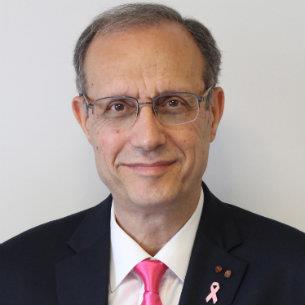It was such a great pleasure and satisfaction to organize and hold the 18th Annual Best of ASCO (BOA) Lebanon Meeting on July 7-8, 2023, at the American University of Beirut Medical Center (AUBMC) in a hybrid format from the Daniel ACC Building Ground Floor Conference Rooms. Speakers and attendees in Lebanon were present in person while speakers and attendees from outside Lebanon participated online. Outstanding advances in cancer research and patient care were discussed. This year, we changed the session format by presenting only two or three abstracts and scheduling 20 to 30 minutes of discussion by the session chairs, in order to allow structured discussions and opportunities for take-home messages and expert recommendations. World-renowned speakers and investigators were introduced briefly, and ample time was allowed for discussions.
BOA Lebanon 2023’s scientific sessions began with early breast cancer. Dr. David Cameron, University of Edinburgh, Scotland, discussed the NATALEE trial which showed that adjuvant ribociclib added to endocrine therapy improved invasive disease-free survival vs. placebo plus endocrine therapy alone; Dr. Etienne Brain, Institut Curie, France, discussed monarchE trial updates showing similar benefits in patients younger and older than 65, and maintained benefit in patients who had dose reductions and called for attention to potential toxicities in older patients; I discussed the EBCTCG meta-analysis confirming the significant benefits of adjuvant ovarian function ablation/suppression in patients who are premenopausal. In the advanced breast cancer (ABC) session, Dr. Ahmad Awada, Institut Jules Bordet, Hopital Universitaire de Bruxelles, Belgium, discussed the SONIA trial which showed similar progression-free survival-2 (PFS-2) results whether CDK4/6 inhibitors are used in the first line or second line. Extensive discussions noted that SONIA trial results were highly echoed and at least they allow oncologists now to use endocrine therapy alone in the first line in many circumstances such as in older patients and in those who have low-burden disease, non-visceral metastasis, and long disease-free intervals. Dr. Javier Cortes, International Breast Cancer Center, Spain, presented the final positive survival results of the TROPiCS-02 trial for use of sacituzumab govitecan in patients with HER2-low ABC.
The GI sessions were discussed by Dr. Julio Garcia Aguilar and Dr. Ghassan Abou-Alfa, both at Memorial Sloan Kettering Cancer Center, United States, and included the Plenary Session PROSPECT trial of neoadjuvant chemoradiation vs. neoadjuvant FOLFOX chemotherapy with selective use of chemoradiation, followed by total mesorectal excision for the treatment of locally advanced rectal cancer, and also the OPRA trial. Those trials represent significant advances for better management of advanced rectal cancer while preserving better quality of life by either omitting radiation therapy or omitting surgery in certain cases.
The lung session abstracts were discussed by Dr. Suresh Ramalingam, Emory University, United States, and Dr. Fadlo Khuri, American University of Beirut, Lebanon, and included the Plenary Session ADAURA trial of adjuvant osimertinib and improved overall survival advantage in EGFR-mutant early-stage NSCLC. Extensive discussion followed regarding optimal management and ensuring availability of standard-of-care drugs in all countries where international clinical trials are conducted.
Dr. Hussein Tawbi, MD Anderson Cancer Center, United States, discussed the significant advances in adjuvant therapy in melanoma, and the Plenary Session CNS abstract INDIGO was discussed by Dr. Hazem Assi, American University of Beirut, Lebanon. The INDIGO trial showed significant PFS and OS with the new promising vorasidenib in patients with recurrent or glioma with IGH1/2 mutation.
Day 2 started with hematology sessions with Dr. Mohamad Mohty, INSERM, France, and Dr. Ali Bazarbachi, AUBMC, Lebanon, who discussed CAR-T cell therapy for patients with lenalidomide-refractory multiple myeloma and the Plenary Session SWOG 1826 on nivolumab-AVD vs. brentuximab-AVD in advanced classical Hodgkin’s disease. Discussants stressed the importance of long-term follow-up data.
The GYN cancer session was discussed by Dr. Mian Shahzad, Moffitt Cancer Center, United States, presented abstracts including the Canadian study that showed no benefit from radical hysterectomy vs. simple hysterectomy, both with pelvic lymph node dissection, in patients with early-stage cervical cancer.
At the GU session, kidney abstracts were discussed by Dr. Toni Choueiri, Dana-Farber Cancer Institute, United States, who presented his own CONTACT-03 study that showed no benefit from rechallenging patients with immunotherapy (IO) after failure of immunotherapy-based therapy. Panelists agreed that the CONTACT-03 study is an important negative study and should result in avoidance of toxicities to patients and savings to society. Dr. Morgan Rouprêt, Sorbonne University and Pitié-Salpétrière Hospital, France, discussed bladder cancer abstracts including SWOG S1011 that showed no benefit of extended lymphadenectomy performed at the time of radical cystectomy vs. standard lymphadenectomy. Dr. Samer Salah, King Hussein Cancer Center, Jordan, and Dr. Bassem Youssef, AUBMC, Lebanon, discussed the prostate abstracts including TALAPRO-2 adding talazoparib to enzalutamide in first-line therapy for patients with metastatic castrate-sensitive prostate cancer (CSPC) harboring homologous recombinant repair alterations, and PEACE 2 on prostate irradiation for de novo CSPC.

Above: Faculty and fellows at the final GU session during the Best of ASCO Lebanon 2023 meeting.
Best of ASCO Lebanon is always a special meeting and multidisciplinary oncologists love to attend it, including those of us who attend the ASCO Annual Meeting in Chicago, where it is impossible to attend all sessions. At Best of ASCO, we select the most important and highly rated presentations. We insist on having original abstracts presented as is and allow conclusions and open discussions, including non-Best of ASCO comments made after the presentation. Best of ASCO is also a great opportunity for hematology/oncology-in-training physicians, to get accustomed to how clinical research is conducted by listening to clinical trial backgrounds, unmet needs, methods, results, and conclusions.
Best of ASCO 2023 was organized by the Division of Hematology Oncology of the Department of Internal Medicine and the Naef K. Basile Cancer Institute of the American University of Beirut under license from ASCO, in collaboration with the Lebanese Society of Medical Oncology (LSMO) and the Arab Medical Association Against Cancer (AMAAC).


Recent posts